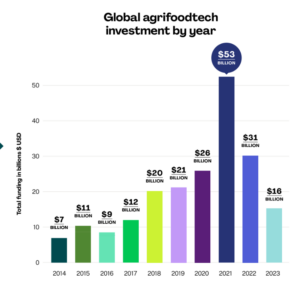Vestaron wants farmers to know that its peptide-based products are different from existing microbial products, offering more consistent efficacy with the same environmental benefits.
Peptide-based biopesticide company Vestaron closed a $40 million Series B led by Danish life sciences group Novo Holdings alongside continuing investors Anterra Capital, Cultivian Sandbox, Open Prairie Ventures, and Pangaea Ventures.
Peptides are small proteins with proven modes of action, making them just as effective as traditional synthetics, according to the Michigan-based startup. Biologics, in general, are a new class of crop inputs that aim to help farmers reduce their dependence on conventional chemical crop inputs that have lead to a number of environmental stresses. The news is full of headlines detailing Monsanto’s legal battles over its herbicide product Roundup and its link to cancer, while farmers in the midwest are battling herbicide-resistant superweeds, to name a few examples.
Some conventional products are even facing legal bans that would prohibit their use entirely. The US Environmental Protection Agency announced earlier this month the cancellation of registrations for 12 neonicotinoid pesticides.
Rath agrees that farmers are skeptical about biologics, noting that many of these products often only work in certain specific conditions. Vestaron has had to work to educate farmers about its peptide-based products, which are not akin to microbials, she says. Instead, they are much more similar to the small molecule synthetics that growers are accustomed to applying to their crops.
“Interestingly, in contrast to pharma, ‘biologics’ in agriculture has come to be synonymous with ‘microbials.’ While there is certainly a rich portfolio of microbial crop-enhancement technologies, there are very few microbial crop protection technologies.” Anna Rath, president and CEO of Vestaron, wrote to AFN via email. “This is in part because effective crop protection technologies require known and proven modes of action, which microbials often lack. Vestaron is really something new in being a truly “biologics” company focused on specific peptides that have the same known, proven modes of action as existing small molecule synthetics, but with the safety and environmental profile of biologics.”
“To some extent, you could say that all of the major agchems companies are our competitors, but obviously they are not yet focused on biologics,” Rath says. “There are no other companies focused on pesticides based on isolated biologic molecules that are nearly as advanced as Vestaron.”
The new round of funding will be used to help Vestaron commercialize its Spear family of products, including expanding its market to new geographies and accelerating the development of new peptide-based biopesticides to add to the lineup.
“We are extremely excited to welcome Novo Holdings as an investor. They are exceptionally well-regarded in life science investing and we consider it a great compliment that they chose us as their first agtech investment,” Rath adds. “They bring great know-how in fermentation-based manufacturing as well as a clear vision for helping to build Vestaron into a major player and revolutionary in the space of ag chemicals.”
Its two existing products, Spear-T, is designed for greenhouse use and intended to control four major pests that plague greenhouse crops: thrips, whiteflies, aphids, and mites. The second product, Spear-Lep, is intended for use in the field and helps to control lepidopteran pests.
Both products are based on Vestaron’s Spear peptide, which has been assigned a novel nerve and muscular mode of action code by the Insect Resistance Action Committee. This code verifies that Spear targets the nicotinic acetylcholine receptor, according to Vestaron, which is responsible for approximately 30% of the $18 billion global insecticide market. Six key nerve and muscular receptors collectively account for 80% of the global insecticide market, and Vestaron has peptides in its pipeline capable of addressing all of them.
Interest in biologics is building as farmers look for new solutions to tackle age-old crop production problems. But there are few investors who fully understand the space, according to Rath, and the fact that many of the funds with sufficient expertise in biologics are small in stature or currently raising, can be a limiting factor.
















Sponsored
International Fresh Produce Association launches year 3 of its produce accelerator